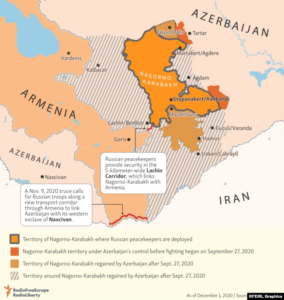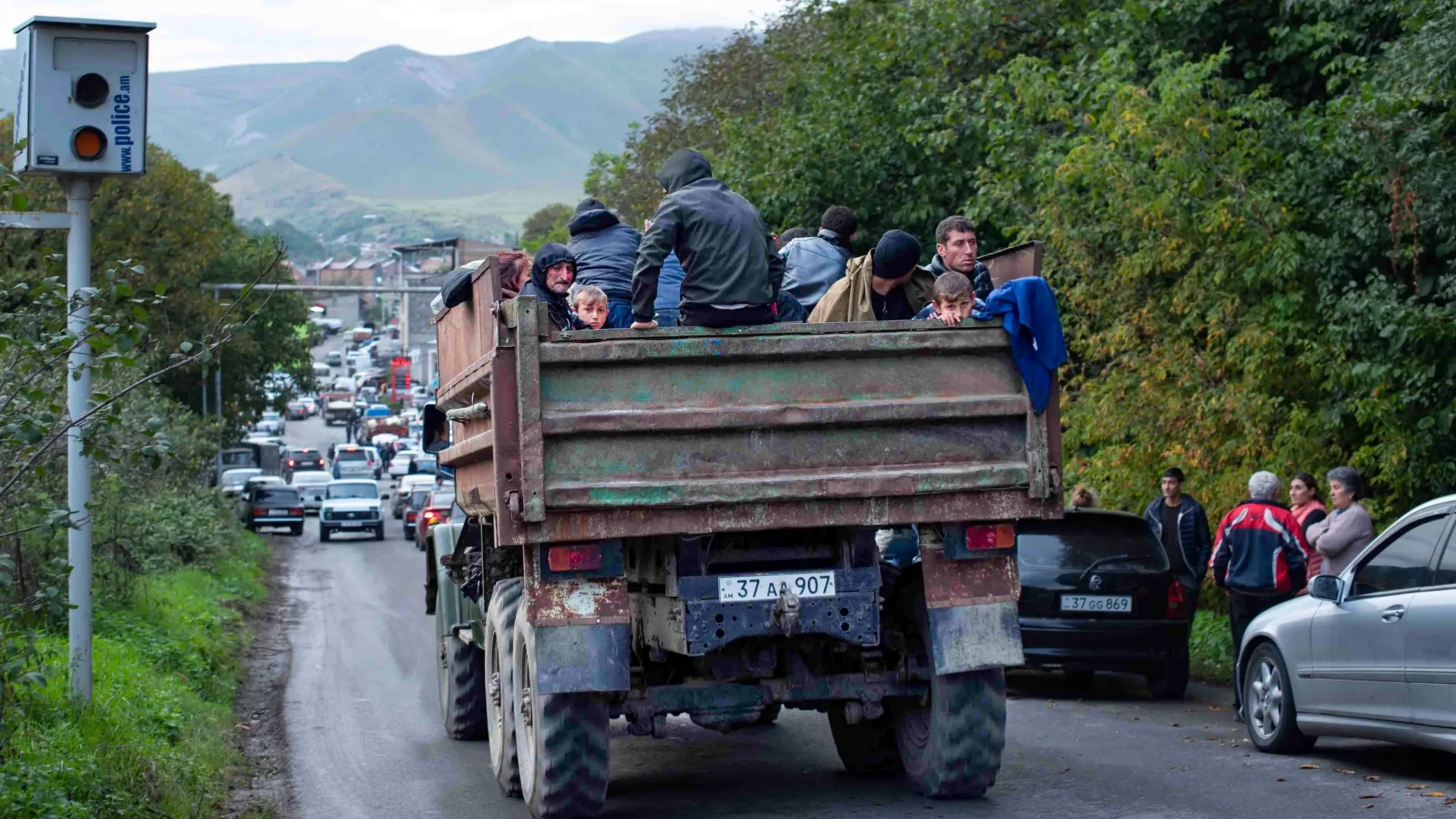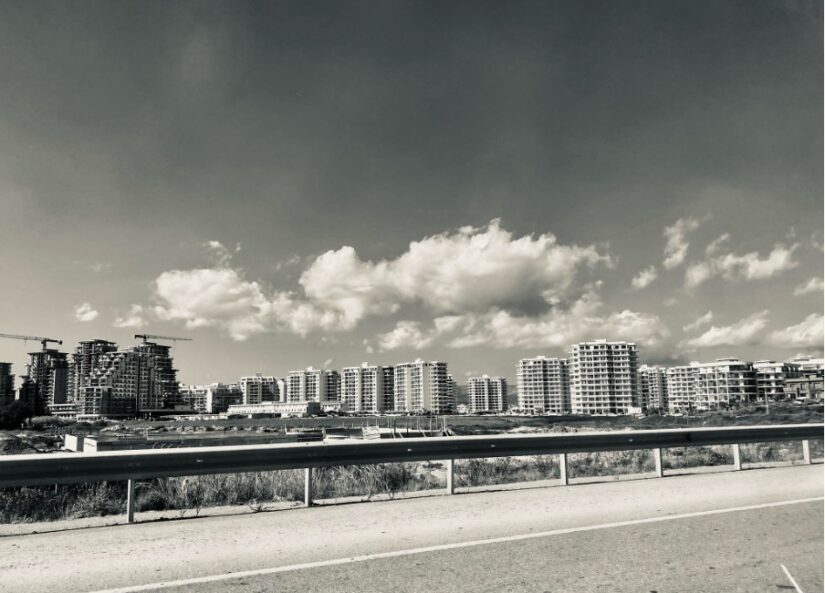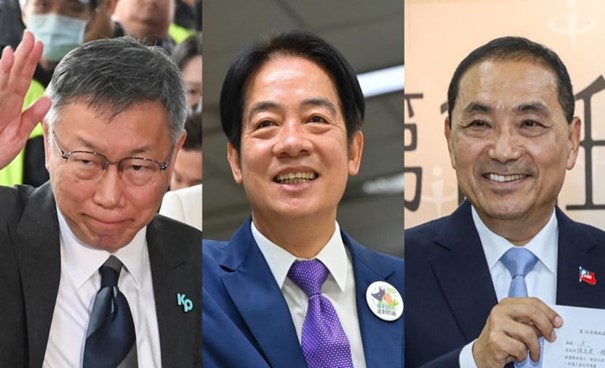Renewed Violence in Nagorno-Karabakh: An Endgame or More Instability to Come?
On September 19, 2023, Azerbaijani armed forces began large-scale shelling of targets in Nagorno-Karabakh, causing death, injury, and damage to property. The active hostilities did not come as a surprise. In preceding weeks, there were numerous reports of the build-up of Azerbaijani troops on the line of contact with Nagorno-Karabakh as well as with Armenia. The appearance of a new symbol on military hardware – an upside-down letter A – added to the speculations that plans were underway for a new round of attacks.
The massive bloodshed of the Second Karabakh War may have come to an end after forty-four days with the trilateral agreement brokered by Moscow and signed by the leaders of Russia, Azerbaijan, and Armenia on the night of November 9-10, 2020. However, acts of violence against what remains of Nagorno-Karabakh patrolled by Russian peacekeepers and against Armenia proper have been a regular phenomenon ever since the spring of 2021. There is a rather lengthy Wikipedia entry laying out major and minor incursions and attacks which have cost lives and have damaged infrastructure. Other practices, such as kidnappings, cattle rustling, and the blocking of highways by Azerbaijani forces have added to tensions. The most far-reaching such incidents were the fighting on November 16, 2021 and September 12-14, 2022, both on the effectively new borders between Armenia and Azerbaijan. In Nagorno-Karabakh, beyond other documented violations, the ongoing partial or whole blockade remains the issue of greatest concern, to the extent that its possible consequences have been characterized as “genocidal” by the founding chief prosecutor of the International Criminal Court (ICC), Luis Moreno Ocampo.
The government of Azerbaijan offers its own perspectives on the developments mentioned above. Inconsistent readings of the November 9-10, 2020 statement between Baku and Yerevan lie at the heart of the matter. In addition, selective understandings and applications of public international law by Baku exacerbate the circumstances. Finally, the role of the international community – in particular, cross-negotiations, or perhaps short-circuited negotiations, led in parallel by the Kremlin and the West – have largely proven ineffective.

Image: Nagorno-Karabakh after ceasefire of Nov 9-10, 2020 (Source: RFE/RadioLiberty)
Divergent Interpretations and Expectations
Two of the provisions of the ceasefire in 2020 have been particularly prone to disparate interpretations by Yerevan and Baku. First, the withdrawal of Armenian troops. The Azerbaijani government has consistently demanded that there be no armed Armenians in Nagorno-Karabakh. The government of Armenian has insisted that it maintains no armed forces in that territory. Yerevan considers the Nagorno-Karabakh defense army a separate entity over which it has no control. Baku expects Yerevan to order those Nagorno-Karabakh forces to disarm and leave. It is hard to imagine any middle ground across these two interpretations.
Second, the unblocking of transportation infrastructure supervised by Russian border guards. For Yerevan, that means all borders should be open for everyone and that each state controls whatever territory belongs to it. For Baku, the interpretation has been less consistent, hinting at demands of sovereign passage to connect with its exclave of Nakhchivan/Nakhichevan in parallel with the Berdzor or Lachin Corridor, the sole highway connecting Armenia with Nagorno-Karabakh. The forcible establishment of a checkpoint on that road by Azerbaijani forces – effectively stopping its use as a corridor – suggests that, for Baku, the second provision may be subject to substantial re-interpretation.
International Law Under Question
In fact, the entire trilateral statement – the agreement for a ceasefire – has come under question. Azerbaijan has made use of force on numerous occasions since 2020, as mentioned. It had agreed not to do so even before the Second Karabakh War as part of its obligations under various commitments and negotiations initiatives.
Baku has showcased a cynical attitude, or at best a selective understanding, regarding its international obligations. For example, it has long framed the four UN Security Council resolutions of 1993 as a recognition of Azerbaijani territorial integrity and a crime of aggression by Armenia, whereas the texts of those resolutions make a clear distinction between the Republic of Armenia and “the Armenians of the Nagorny-Karabakh region of the Azerbaijani Republic”. Moreover, the call in those resolutions to cease hostilities applied to all sides, including Baku.
More recently, the International Court of Justice ordered Azerbaijan in February, 2023 “to ensure unimpeded movement of persons, vehicles and cargo along the Lachin Corridor in both directions”. In July, after the border checkpoint was set up with constructed infrastructure, the court issued another ruling, stating that its earlier binding order remained in force. The Azerbaijani leadership, however, presented that second ruling as a legal victory because the court did not change its decision, emphasizing instead the necessity of sovereign control over borders.
As such, overarching a number of international law violations, the government of Azerbaijan invokes sovereignty and territorial integrity as a fundamental point of departure. This is indeed a strong position. It is impossible to deny that the Nagorno-Karabakh region used to be a part of Soviet Azerbaijan. No state ever officially recognized the Nagorno-Karabakh Republic or Artsakh as an independent entity.
However, simultaneous with affirming its rights under international law, Baku has demonstrated less enthusiasm regarding its international obligations. All states do have the sovereign right to deal with internal matters as they see fit. But committing massive acts of violence within its own borders is prohibited to any state. It runs counter to numerous treaties and conventions to which Azerbaijan is party. Official discourse, meanwhile, frames the Armenians of Nagorno-Karabakh as citizens with full rights within a cosmopolitan Azerbaijani society and state – as long as they agree to re-integrate. But the process of re-integration has been implemented through violence. The policies and actions of the government of Azerbaijan do not reflect those of a state reaching out to its own citizens.
The discourse from the Armenian side continues to emphasize that the real intention of the Azerbaijani leadership is to forcibly remove the Armenian population from Nagorno-Karabakh – ethnic cleansing or genocide. Azerbaijan countered the findings of genocidal consequences by the former ICC prosecutor Ocampo mentioned above by commissioning a British legal expert to produce a separate study. The actions of September 19, 2023, however, lend their support to a vision in Baku of Nagorno-Karabakh without an Armenian population. For example, the Ministry of Defense of Azerbaijan stated that a humanitarian corridor will allow evacuations from Nagorno-Karabakh. A senior official for his part issued a strongly-worded ultimatum to the leadership in Stepanakert. These statements follow occasions when the Azerbaijani president, Ilham Aliyev, made clear that the Armenian population of Nagorno-Karabakh has to make a take-it-or-leave-it choice.
As Laurence Broers – the most perceptive and insightful scholar of the Nagorno-Karabakh conflict – observes, “A peace that is extorted today will unravel tomorrow”. It sets a tone which echoes the worst dismissiveness of the international community to international law over the past two decades, from the invasion of Iraq in 2003 to the invasion of Ukraine in 2022.
Force vs. Diplomacy
The timing of this latest development is somewhat unexpected, given that the UN General Assembly is in session. On the one hand, that event may serve to distract world leaders or, at least, bureaucrats at ministries of foreign affairs. On the other hand, it provides a forum for the parties concerned to address numerous influential actors more efficiently and quickly.
The more significant context is the diplomacy that has gone on in fits and starts between Baku and Yerevan since the end of the Second Karabakh War. The leadership of the two countries has met on numerous occasions with the separate intermediation of Moscow, Brussels, and Washington, DC. The Western actors seem to co-ordinate their efforts, whereas the Kremlin maintains its own track. All in all, there has been little tangible, publicly-visible progress from any direction.
Tensions between Yerevan and Moscow have become particularly noticeable in the very recent past. Armenia has disengaged from the Collective Security Treaty Organization, to which it has appealed numerous times for support on its borders with Azerbaijan. Although the Armenian government has taken a more or less neutral stance on the war in Ukraine, Anna Hakobyan, the wife of Prime Minister Nikol Pashinyan recently paid an official visit to Kyiv. Above all, the joint military exercises with the United States – lasting ten days, still ongoing in Armenia as shelling continued in Nagorno-Karabakh – caused immense displeasure in the Russian leadership. The most well-known expert on the Nagorno-Karabakh conflict, Thomas de Waal speculated that such a low point in relations could be one reason for Baku to seize an opportunity for extreme measures, expecting a lack of reaction from Moscow.
The role of Russia remains central in the South Caucasus, whether in a diplomatic setting or across fighting armies. The violence of September 19, 2023, was accompanied by additional accusations and admonishments from elite circles in Moscow against the Pashinyan administration. A rally broke out at Republic Square in central Yerevan, where the office of the prime minister is located, as well as the Russian embassy in the city. Pashinyan refuses to have Armenia actively respond with force. Some protestors and public figures have called for the government to resign. Others are holding up placards condemning the Russian leadership.
It would be banal to say that the issue of Nagorno-Karabakh remains complex and multifaceted and that it has added an additional layer of humanitarian concerns to the region and to the international community. The relevance of the Russian presence – its effectiveness, at any rate – has seemed compromised since the spring of 2021, even more so after this latest round of violence. What is the purpose of the Russian peacekeeping operation at this point?
At the same time, it is worth asking: what is the alternative? If the West or the United States, in particular, has set as a strategic goal the removal of Russia or the reduction of its influence in the South Caucasus, the leaders in Washington and Brussels must realize that a power vacuum will emerge as a result. Perhaps they genuinely expect Yerevan and Baku to come to an enduring peace. Or perhaps they see Ankara with a more prominent role in the region. Tehran is not too far away, either, and has interests and concerns of its own.
Ultimately, if the Western governments cannot offer a serious and realistic alternative to security arrangements in the region, then – despite their demonstrated lack of effectiveness – the Russian presence will continue to abide and measures of diplomacy and international law will continue to be invoked as mechanisms to manage the conflict.
Author: Nareg Seferian






